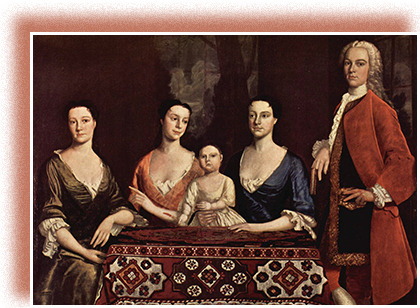English Empires 1660-1763

Overview
The eighteenth century witnessed the birth of Great Britain (after the union of England and Scotland in 1707) and the expansion of the British Empire. By the mid-1700s, Great Britain had developed into a commercial and military powerhouse; its economic sway ranged from India, where the British East India Company had gained control over both trade and territory, to the West African coast, where British slave traders predominated, and to the British West Indies, whose lucrative sugar plantations, especially in Barbados and Jamaica, provided windfall profits for British planters. Meanwhile, the population rose dramatically in Britain’s North American colonies. In the early 1700s the population in the colonies had reached 250,000. By 1750, however, over a million British migrants and African slaves had established a near-continuous zone of settlement on the Atlantic coast from Maine to Georgia. During this period, the ties between Great Britain and the American colonies only grew stronger. Anglo-American colonists considered themselves part of the British Empire in all ways: politically, militarily, religiously (as Protestants), intellectually, and racially.
Learning Objectives
- Analyze the causes and consequences of the Restoration
- Identify the Restoration colonies and their role in the expansion of the Empire
- Identify the causes of the Glorious Revolution
- Explain the outcomes of the Glorious Revolution
- Analyze the role slavery played in the history and economy of the British Empire
- Explain the effects of the 1739 Stono Rebellion and the 1741 New York Conspiracy Trials
- Describe the consumer revolution and its effect on the life of the colonial gentry and other settlers
- Explain the significance of the Great Awakening
- Describe the genesis, central ideas, and effects of the Enlightenment in British North America
- Describe the wars for empire
- Analyze the significance of these conflicts
Textbook Readings
Module Supplemental Readings/Videos
- Charleston Museum’s interactive The Walled City
the history of Charleston. - Issues of the American Weekly Mercury
- Digital Locke Project (http://www.digitallockeproject.nl/)
John Locke’s philosophical texts. - Map of New York in the 1740s (https://digitalcollections.nypl.org/items/510d47e4-7375-a3d9-e040-e00a18064a99) at the New York Public Library’s digital gallery
- PBS’s Benjamin Franklin site Worldly Ways section (http://www.pbs.org/benfranklin/exp_worldly_map.html) of to see an interactive map showing Franklin’s overseas travels and his influence around the world.
- Diary of a provincial soldier who fought in the French and Indian War on the Captain David Perry Web Site (http://homepages.rootsweb.com/~dagjones/captdavidperry/chapter02.html)
- Deerfield Massacre of 1704 - good website: https://www.historic-deerfield.org/
Glossary of Key Terms
Act of Toleration: Passed in Maryland, it guaranteed toleration to all Christians but decreed the death penalty for those, like Jews and atheists, who denied the divinity of Jesus Christ, which ensured that Maryland would continue to attract a high proportion of Catholic migrants
Albany Congress: Inter-colonial congress summoned by the British government to foster greater colonial unity and assure Iroquois support in the escalating war against the French.
English Civil War: Armed conflict between royalists and parliamentarians, resulting in the victory of pro-Parliament forces and the execution of Charles I.
First Anglo-Powhatan War: Series of clashes between the Powhatan Confederacy and English settlers in Virginia.
French and Indian War: War between the British and the French in North America. It resulted in the expulsion of the French from most of the North American mainland
Fundamental Orders: Drafted by settlers in the Connecticut River Valley, document was the first "modern constitution" establishing a democratically controlled government.
Glorious Revolution: Relatively peaceful overthrow of the unpopular Catholic monarch, James II, replacing him with Dutch-born William III and Mary, daughter of James II. William and Mary accepted increased Parliamentary powers and new limits on monarchical authority.
Great Awakening: Religious revival that swept the colonies that placed an emphasis on direct, emotive spirituality.
King George's War: North American theater of Europe's War of Austrian Succession that again pitted British colonists against their French counterparts in Canada.
King William's War: War fought largely between French trappers, British settlers, and their respective Indian allies from 1689-1697.
mercantilism: Economic theory that closely linked a nation’s political and military power to its bullion reserves; generally favored protectionism and colonial acquisition as means to increase exports.
Molasses Act: Tax on imported molasses passed by Parliament in an effort to squelch the North American trade with the French West Indies.
Navigation Acts: Series of laws passed, beginning in 1651, to regulate colonial shipping; the acts provided that only English ships would be allowed to trade in English and colonial ports, and that all goods destined for the colonies would first pass through England.
patroonships: Vast tracts of land along the Hudson River in New Netherlands granted to wealthy promoters in exchange for bringing fifty settlers to the property.
proprietary colonies: Colonies -- Maryland, Pennsylvania, and Delaware -- under the control of local proprietors, who appointed colonial governors.
Queen Anne's War: Second in a series of conflicts between the European powers for control of North America, fought between the English and French colonists in the North, and the English and Spanish in Florida.
royal colonies: Colonies where governors were appointed directly by the King.
salutary neglect: Unofficial policy of relaxed royal control over colonial trade and only weak enforcement of Navigation Laws that lasted from the Glorious Revolution to the end of the French and Indian War in 1763.
Second Anglo-Powhatan War: Effort by the Indians to dislodge Virginia settlements. The resulting peace treaty formally separated white and Indian areas of settlement.
War of Jenkins's Ear: Small-scale clash between Britain and Spain in the Caribbean and in the buffer colony, Georgia. It merged with the much larger War of Austrian Succession in 1742.